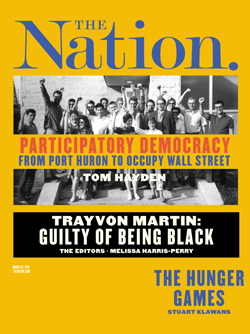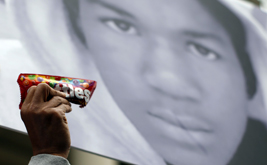Go Greek
Johnstown, N.Y.
If you really want to help the Greeks—poignantly portrayed by Maria Margaronis in "Greece in Meltdown" and in your lead editorial, "The Failure of Austerity" [March 19]—take a vacation there, book an island cruise, spread some money in the birthplace of Western civilization. And when you see the tragedy of austerity, imagine it as a possible coming attraction for the United States.
DAVID CHILDS
Manifesto Destiny
Ottawa
Victor Navasky's comments on Il Manifesto are right on target ["Noted," March 19]. Il Manifesto is not only an excellent journal of opinion; it is probably the best daily newspaper in Italy, published six times a week, with remarkable coverage of national and world events.
JORDAN BISHOP
Our Pals to the South
Los Angeles
In "Genocide on Trial" [March 19], Laura Carlsen aptly summarizes the perfidy of US-backed regimes in Central America. Gen. Rios Montt is also a graduate of the infamous US Army School of the Americas (long ago renamed Western Hemisphere Institute for Security Cooperation). Guatemala's current president, Otto Perez Molina—another SOA graduate, a former chief of G2 and a CIA asset—was implicated in the assassination, in 1994, of Judge Edgar Ramirez Elías Ogaldez.
W.E. GUTMAN
Killing the Planet Softly
Gig Harbor, Wash.
Hooray for Michael Klare's March 19 "The New Fossil Fuel Fever," which explains so clearly the dangers, costs and limits of fossil fuels. The conclusion is obvious: we need an immediate, huge investment in clean energy.
BILL NERIN
Seattle
Two of Michael Klare's excellent points need more emphasis. The first is that the economic benefits of unconventional oil (tar sands) and natural gas (hydrofracking) are less than supposed. If the true long-term environmental cost were charged, plus a depletion tax for using up a nonrenewable resource, the profit would disappear and alternative energy would look better. The second point is the "energy trap," as physics professor Tom Murphy calls it. Just when you need lots of surplus energy to build a renewable energy economy, it's not there. That is, if delayed, investment in a postcarbon economy may never occur. We'll simply live with less, as vested interests fight to keep their share of a shrinking pie.
DICK BURKHART
Wabasha, Minn.
Michael Klare rightly focuses on the
notion of a fossil fuel bridge to real alternatives, noting that a bridge with no alternatives is a bridge to nowhere. One of the bridge pieces he left out is the link between gas sand-frack drilling and the silica-sand mining used in the process. The upper Mississippi River Valley from Wisconsin and Minnesota south to Iowa and Illinois contains silica sand used in fracking. The mining companies have rapaciously descended, buying property from farmers for too-good-to-refuse prices and enlarging existing aggregate mines promising jobs and a boost to the local economy. All without thought for the environment or the people who live in and around the mines.
But citizens are beginning to organize. They note that mining has altered lives and grossly affected the environment—relentless strings of diesel semi trucks are hauling tons of sand twenty-four hours a day. With the help of regulatory agencies, citizens have raised immediate and longer-term concerns with some successes: moratorium periods to research and discuss the issues, and the creation of conditional use permits.
The problem is not singular: deepwater drilling in the Gulf of Mexico or off the coast of Brazil, sand-frack drilling in Pennsylvania or Wyoming, or a silica-sand mine next door. It's all connected.
TOM WILKINSON
Impunity In-and Outside Haiti
Windsor, Ontario, Canada
In "Duvalier and Haiti's Triple Threat" [March 19], Amy Wilentz doesn't consider that a series of US presidents should be in the dock for what they have done to Haiti. Yet she pontificates to Haitians that "impunity is no good for democracy." A US-backed coup in 2004 led to two years of dictatorship under Gerard Latortue—whom Wilentz didn't mention—which led to at least 4,000 political murders, according to a scientific study published in The Lancet. It was also a US-backed coup that led to thousands of murders between 1991 and 1994, the first time Aristide was overthrown. Presidents Bush Sr. and Clinton ensured that the perpetrators escaped justice and also infiltrated Haiti's security forces. Thanks to WikiLeaks we know the Bush Jr. administration did the same thing, ensuring that paramilitary thugs were absorbed into the Haitian police.
Martelly owes his presidency to US bullying. The overwhelming majority of Haitian voters shunned the US-imposed electoral farce. Even if Haitians succeed in once again electing a president like Aristide, who tries to prioritize their interests, the paramilitary killers are well positioned to strike again. None of this raises concern about US "impunity" for Wilentz.
It is astounding how liberals like Wilentz internalize imperial assumptions. No matter how high the corpses pile up around the world as a result of US policy, "impunity" is always someone else's problem.
JOE EMERSBERGER
Wilentz Replies
Los Angeles
Joe Emersberger says more should be made of US complicity in Haiti's plight. I was operating under the expectation that in The Nation, America's viselike grip on all aspects of Haitian governance is a given. Who doesn't know of the nineteen-year US occupation of Haiti? Who doesn't know that we colluded for years with the shocking Duvalier regimes? Is there a Nation reader who is unaware of US collaboration, or worse, in Aristide's destruction?
I have written here about OAS meddling and manipulation in the balloting that led to Michel Martelly's election last April. My piece this time was a speculative examination of the inner workings of presidential maneuverings as they go down in Haiti, with a focus on how impunity in the highest places works to undermine Haiti's future. It was not a piece on the sick American history with Haiti, although as Emersberger says, the two are closely related.
I will ignore Emersberger's knee-jerk
remarks about the evils of US foreign policy around the globe, except to say, duh—and that all reflexive leftists, when confronted with any argument, discussion or policy suggestion that doesn't exactly follow the narrative line they love to hear, resort to this larger-picture diatribe.
AMY WILENTZ Read More
Our Readers










